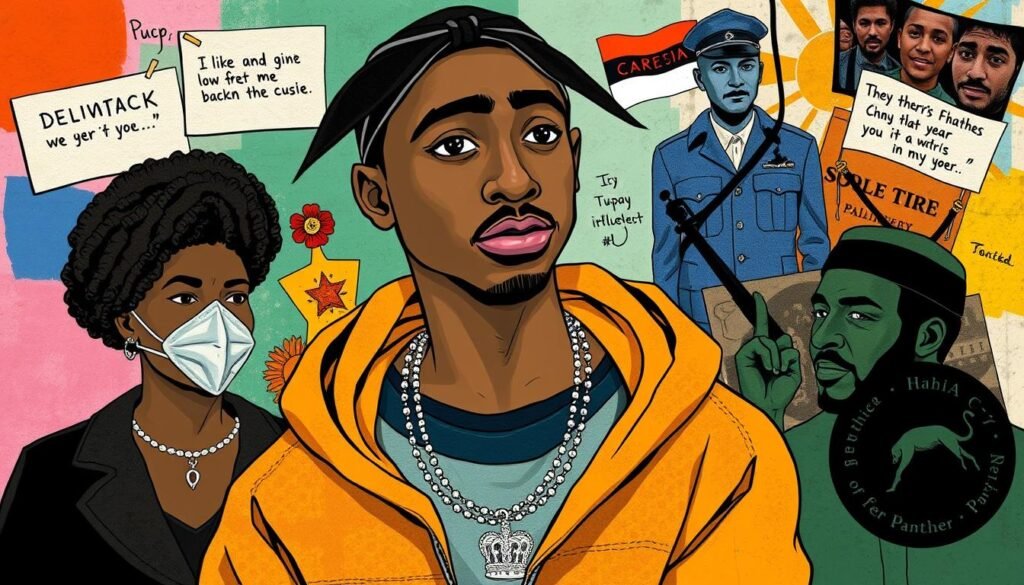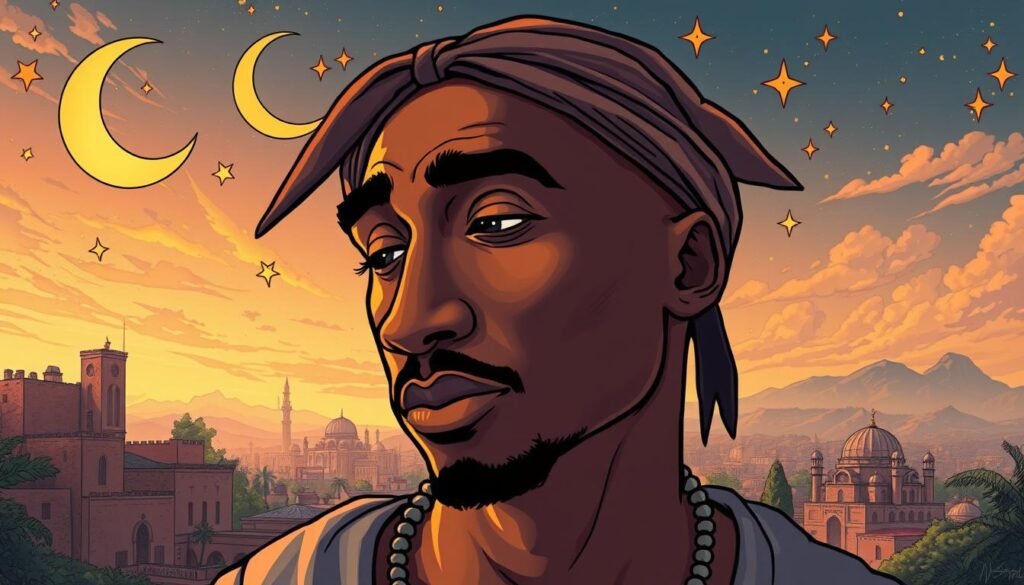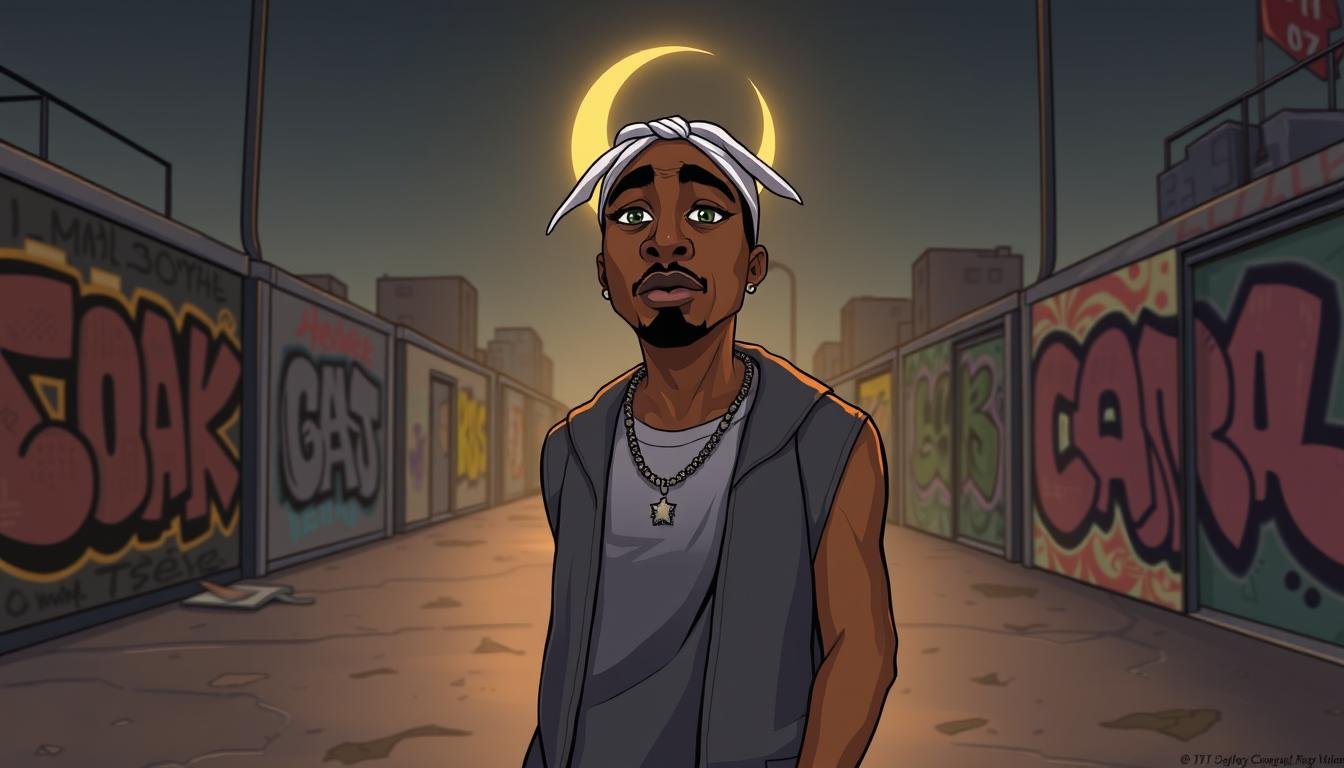When we think of Tupac Shakur, we remember his powerful lyrics and deep social commentary. A big question is: Did Tupac really see himself as a Muslim, or was his faith just part of a bigger spiritual search? Born on June 16, 1971, in East Harlem, New York City, Tupac was shaped by his mother, Afeni Shakur, a Black Panther Party member. His life and music touched on faith and spirituality, drawing from Islam, African spirituality, and Christianity.
This mix of beliefs shaped his view of the world. It also influenced the messages in his music. These messages still touch fans of all ages.
Let’s dive into Tupac’s spiritual path. We’ll look at his upbringing, the complexity of his faith, and how these shaped his message. Was his lack of clear faith a sign of a deeper spiritual quest? Or was it a rejection of religion? Let’s explore Tupac’s beliefs and how they’ve left a lasting mark on his legacy.
Introduction to Tupac Shakur’s Spiritual Journey
Tupac Shakur’s spiritual journey is a story of identity and society. It shows how he explored faith, influenced by his family’s activism. His family was linked to the Black Panther Party, teaching him about justice and personal power.
This journey with spirituality is clear in his interviews. He shared his thoughts on faith openly. Tupac’s views on faith show how environment shapes our beliefs. His life is not just about talent but also about thinking deeply about belief and culture.
Tupac’s Early Life and Religious Background
Tupac Shakur was born Lesane Parish Crooks on June 16, 1971, in East Harlem. His early life was complex, thanks to his family’s deep political and cultural roots. His upbringing greatly shaped his identity and spiritual views.
His mother, Afeni Shakur, was a Black Panther Party member. This gave Tupac a strong sense of cultural pride and community awareness from a young age. The family’s exposure to various ideologies, including religious influences, deeply impacted Tupac’s development.
His father’s connection to Islam introduced spiritual concepts that Tupac found meaningful. Growing up in a vibrant neighborhood, Tupac was surrounded by diverse cultures. This enriched his perspective on life and faith.
Many aspects of his upbringing influenced his music and spiritual beliefs. The family’s legacy discussions gave Tupac a unique view of art and religion. This background shaped his complex relationship with spirituality, influencing his views on religion and identity.
Influence of Tupac’s Family on His Beliefs
Tupac Shakur’s family had a big impact on his beliefs. His mom, Afeni Shakur, was part of the Black Panther Party. She taught him about activism and social justice early on.
This upbringing made Tupac strong and aware of his culture. Afeni’s fight for justice taught him to stand up for what he believes in.
Tupac grew up learning about resistance and empowerment. His family, including his stepdad Lumumba Abdul Shakur, was involved in social movements. They worked to free Black people and fight against oppression.
The Shakur family’s teachings deeply influenced Tupac. They shaped his art and his beliefs.

Tupac’s family background was all about justice and equality. Many family members were part of the Black Panther Party. This taught Tupac about cultural identity and the need for change.
He believed knowing your background is key to making choices in life.
Is Tupac Muslim? Understanding His Views on Religion
Tupac Shakur’s faith journey is both intriguing and complex. Some say he was Muslim, but his views changed over time. This change influenced his art and beliefs.
The Complexity of His Faith
Tupac’s faith was a mix of different influences. He started as a devout Muslim but later explored broader spirituality. His songs touched on themes of redemption and hope, inspiring many.
Public Statements About Religion
Tupac shared his thoughts on religion with the world. He sometimes spoke of his connection to Allah, other times rejected traditional religion. Songs like “Hail Mary” and “Ghetto Gospel” show his use of Christian symbols in a personal way. This shows Tupac’s ongoing spiritual exploration, adding depth to his legacy.
Tupac’s Relationship with Islam
Tupac Shakur’s journey with Islam was complex. He admired the religion but his views changed over time. Growing up, he was exposed to many ideas, including Islam, thanks to his mother, Afeni Shakur.
Afeni Shakur was a key figure in Tupac’s life. She was deeply involved in the Black Liberation Movement. This background shaped Tupac’s early views on life and faith.
Even though Tupac didn’t always call himself a Muslim, he respected Islam. He saw it as a way to understand life, purpose, and community. His words show that faith and identity were key in his art and activism.
Tupac’s connection to Islam grew stronger through his relationships. People like his stepfather Mutulu Shakur and mentor Geronimo Pratt influenced him. They helped him see the world in a new light.
His lyrics often talked about redemption and hope. These themes were inspired by Islamic ideas. So, Tupac’s relationship with Islam was more than just a conversion. It was a deep exploration of his spirituality.
The Role of Islam in Tupac’s Life
Tupac Shakur’s life was deeply influenced by Islam. This showed how his spirituality and friendships went hand in hand. He introduced many friends, like the Outlawz, to Islam’s teachings.
He didn’t push his beliefs on them. Instead, he encouraged them to think about Islam’s wisdom. He believed these teachings could change lives.
Introducing Friends to Islam and Spiritual Teachings
Tupac’s friendships greatly shaped his views on faith. He talked a lot about doing what’s right and fighting against wrong. This was in his music and in talks with friends.
He shared Islamic ideas freely. This sparked curiosity in some of his friends. They started to explore spiritual teachings that meant a lot to them.
Significant Quotes Relating to His Faith
Tupac’s thoughts on spirituality are in many quotes. These quotes show his strong connection to Islamic values. He talked about caring, fairness, and staying strong when things get tough.
His words reflect a key part of Islamic faith. These quotes show how Islam enriched Tupac’s life and the lives of those around him.

Shift from Islam to Other Beliefs
Tupac Shakur’s faith journey was complex and changing. He moved from Islam to a more open spiritual path. This change didn’t forget his Islamic roots but explored many beliefs and practices.
Tupac believed in talking directly to God, showing a deep personal spirituality. He sometimes followed Christian teachings, showing his search for a meaningful spiritual path.
Tupac’s spiritual journey shows he never gave up on spirituality. He wanted a personal connection with the divine. His evolving beliefs remind us that faith is always changing, inviting us to understand its true meaning in our lives.
Tupac’s Legacy and Influence on Religion in Music
Tupac Shakur’s music did more than just entertain. It touched on deep spiritual themes in hip hop. His songs often talked about tough social issues and personal struggles. This made his music a powerful tool for exploring faith and hope.
His songs, like “Changes” and “Dear Mama,” showed his deep understanding of faith and hardship. They reflect on life’s challenges and the importance of family. This shows how Tupac’s music was more than just songs; it was a spiritual journey.
Tupac’s impact on music and faith is huge. He made people think about their beliefs and spirituality. Today, artists are inspired by him to talk about faith and social justice. They carry on his legacy by exploring deep themes in their own music.
We celebrate Tupac’s contributions to music and faith. His work started a conversation about faith and society. His legacy inspires new artists to explore spirituality in their music, shaping the future of hip hop.
Recent Interpretations of Tupac’s Faith
Looking at Tupac Shakur’s legacy, faith has become a big topic. Scholars and fans are drawn to his deep lyrics and spiritual music. Young people, especially those 14 to 21, find God and sacred texts in his music and others in Hip Hop.
Some say Tupac is a “spiritual rapper.” This shows his deep look into faith, compassion, and struggles. It makes people think about spirituality in new ways, challenging old views.
Mainstream hip-hop often deals with religious themes, even if it’s complicated. Ethnomusicologist Christina Zanfagna says artists like Tupac share their spiritual stories. These stories often tackle life’s big questions, making them more real than religious teachings.
Songs like “Black Jesuz” show a different view of God. It’s a view that urban communities can relate to. Tupac’s faith ideas challenge old views, making spirituality more open and relevant today.
The Debate Among Fans: Tupac’s True Beliefs
Fans and scholars are still talking about Tupac Shakur’s beliefs. Some say he was deeply Islamic, while others think he was searching for spiritual truth without any one religion. This debate makes us think about his identity and the struggles he faced.
There’s also a lot of confusion about Tupac’s life. For example, his birth name and his deal with Death Row Records are unclear. Fans wonder if the Makaveli album was released after he died or if it was made before. These questions lead to deep talks about faith and how artists express their beliefs.
Looking into Tupac’s spirituality helps us understand religion in pop culture. In Bosnia, many people see themselves as culturally Muslim but don’t follow the faith strictly. Tupac’s story might be similar. It shows us the human experience of searching for spiritual answers, facing challenges, and finding strength.
FAQ
Is Tupac Shakur Muslim?
What influenced Tupac’s beliefs about religion?
How did Tupac’s family impact his spiritual journey?
Did Tupac consider himself a devout Muslim?
What role did Islam play in Tupac’s life and music?
How did Tupac’s spirituality evolve over time?
What legacy did Tupac leave regarding spirituality in music?
What are recent interpretations of Tupac’s faith?
What is the debate among fans regarding Tupac’s beliefs?

Embracing Faith, One Insight at a Time!
The teachings of the Quran have always guided my path. With a deep passion for Islamic knowledge, I strive to blend the wisdom of tradition with the relevance of today, making the timeless messages of Islam accessible and meaningful for everyone.
Muslim Culture Hub is my platform to share historical insights and thought-provoking articles, exploring both well-known and lesser-discussed aspects of Islamic culture and beliefs. My mission is to create an inclusive online space where everyone can learn, strengthen their faith, and connect with the profound message of Islam.
Join the journey!
May peace be upon you.








